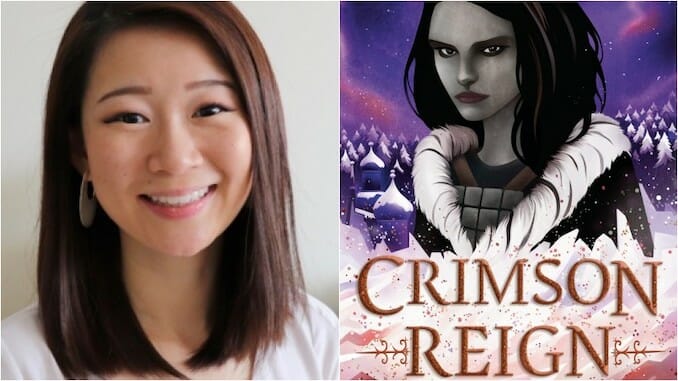Crimson Reign and The Triumph of Amelie Wen Zhao’s Blood Heir Trilogy
Photo: Charlotte Yu
Amelie Wen Zhao’s Blood Heir trilogy waves before its first chapter was ever released, thanks to a storm of pre-release criticism and vitriolic Twitter feuding that eventually caused the publication of the first book in the young adult series to be delayed by several months back in 2019. But if the only reason you’ve heard of Zhao as an author, or of Blood Heir specifically, is due to this particular controversy, its role in the much larger industry debate about representation in teen fiction or the supposed perils of cancel culture, it might be time to reevaluate your stance on this series.
Now, almost three years after Blood Heir’s release, Crimson Reign, the final novel in Zhao’s trilogy has hit shelves and, for those who are curious, it’s pretty great, providing a meaningful ending to the story of Crown Princess Anastacya Mikhailov even as it wrestles with larger thematic questions of belonging and leadership. An action-packed tale full of angsty romance and richly drawn supporting characters who’ve come to matter just as much to the story as Ana herself does, this is a final installment that sticks the landing, with more than a few intriguing twists (and bittersweet moments) along the way.
Set in a world where people known as a vaguely magical subgroup known as Affinites have the ability to control various elements of the physical and natural world, Ana begins the story as an exiled princess demonized for her power to control human blood. She ends it as a woman in charge of her own destiny, having risked her life to secure a better future for the people she once considered it her right to rule. A final installment that is as much about questions of corruption, philosophy, and sacrifice as it is bloody battles, Crimson Reign is a remarkably surprising conclusion to a story that consistently made unexpected choices, from expanding its world to include multiple lead characters and perspectives.
We had the chance to chat with Zhao herself about how it feels to close the door on Ana’s story, the messages she hopes fans will take away from the Blood Heir series, and what’s next for her as a writer.
![]()
Paste: First, congratulations on the end of such a great trilogy! Particularly given the controversy that surrounded Blood Heir’s initial release—which can’t have been easy to navigate—this just all is such a triumph in my book. How does it feel to bring this journey full circle as a writer?
Amelie Wen Zhao: Thank you very much! I feel the same way: triumph at having been able to share my stories with themes from a different point of view, a different part of the world, and a different time of history, with readers who may not have learned about these realities before.
The Blood Heir trilogy is a story of courage against real-world injustices, of a cast of outsiders trapped in different circumstances as a result of hidden and systemic oppression coming together to fight for a better world. Above all, it is the story of holding on to hope even during the darkest of times.
Ana’s journey and her growth as a character is so satisfying to watch unfold. What do you think is the biggest difference between the Ana of Blood Heir and the Ana of Crimson Reign?
Ana’s worldview has been flipped on its head by the time we get to Crimson Reign. In Blood Heir, she defines herself as a rightful heir to her Empire fighting to depose a tyrannical monarch from the throne. She is very much looking inward and driven by her personal desires: her love for her brother, the puppet Emperor suffering under the villain; the desperate need to return everything to the status quo with what remains of her family on the throne; and the fear of her own monstrous blood Affinity. This Ana equates righteousness and justice with simply fighting off the usurper and taking back her throne.
In Crimson Reign, Ana is shaped by loss. She’s lost her dearest friend and meets people who have suffered under the systemic injustices that have flourished under her family’s rule. Even more, she loses the characteristic that has—whether consciously or subconsciously—defined her for her entire life: her blood Affinity. In fantasy (and real life!) the right to rule is often determined by power, of which Ana had plenty; losing her power allows her, for the first time, to see herself for who she is, and what kind of a leader she could be by virtue of not her physical strength, but her choices.
-

-

-

-

-

-

-

-

-

-

-

-

-

-

-

-

-

-

-

-

-

-

-

-

-

-

-

-

-

-

-

-

-

-

-

-

-

-

-

-








































